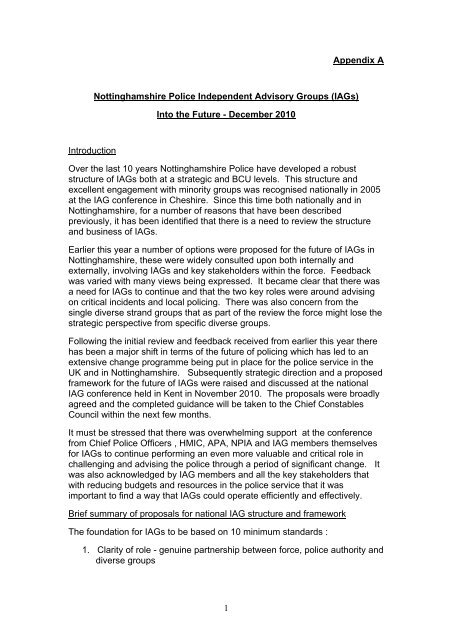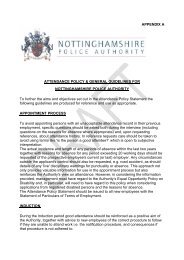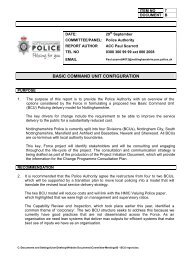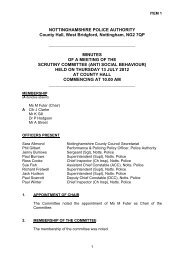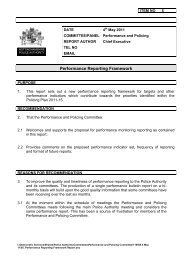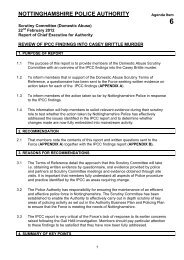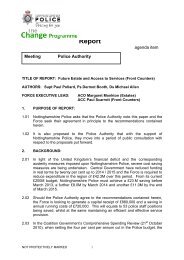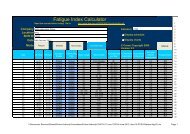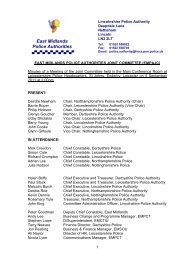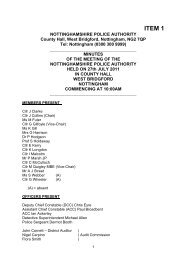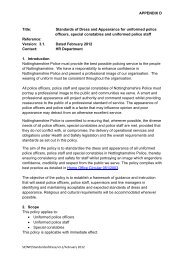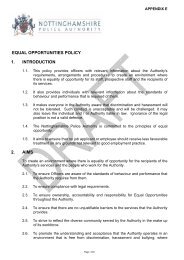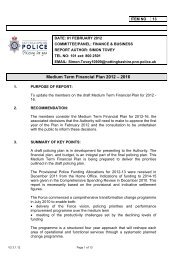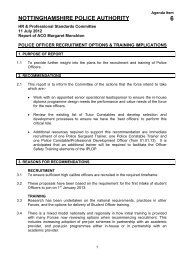IAGs - Nottinghamshire Police Authority
IAGs - Nottinghamshire Police Authority
IAGs - Nottinghamshire Police Authority
Create successful ePaper yourself
Turn your PDF publications into a flip-book with our unique Google optimized e-Paper software.
Appendix A<br />
<strong>Nottinghamshire</strong> <strong>Police</strong> Independent Advisory Groups (<strong>IAGs</strong>)<br />
Into the Future - December 2010<br />
Introduction<br />
Over the last 10 years <strong>Nottinghamshire</strong> <strong>Police</strong> have developed a robust<br />
structure of <strong>IAGs</strong> both at a strategic and BCU levels. This structure and<br />
excellent engagement with minority groups was recognised nationally in 2005<br />
at the IAG conference in Cheshire. Since this time both nationally and in<br />
<strong>Nottinghamshire</strong>, for a number of reasons that have been described<br />
previously, it has been identified that there is a need to review the structure<br />
and business of <strong>IAGs</strong>.<br />
Earlier this year a number of options were proposed for the future of <strong>IAGs</strong> in<br />
<strong>Nottinghamshire</strong>, these were widely consulted upon both internally and<br />
externally, involving <strong>IAGs</strong> and key stakeholders within the force. Feedback<br />
was varied with many views being expressed. It became clear that there was<br />
a need for <strong>IAGs</strong> to continue and that the two key roles were around advising<br />
on critical incidents and local policing. There was also concern from the<br />
single diverse strand groups that as part of the review the force might lose the<br />
strategic perspective from specific diverse groups.<br />
Following the initial review and feedback received from earlier this year there<br />
has been a major shift in terms of the future of policing which has led to an<br />
extensive change programme being put in place for the police service in the<br />
UK and in <strong>Nottinghamshire</strong>. Subsequently strategic direction and a proposed<br />
framework for the future of <strong>IAGs</strong> were raised and discussed at the national<br />
IAG conference held in Kent in November 2010. The proposals were broadly<br />
agreed and the completed guidance will be taken to the Chief Constables<br />
Council within the next few months.<br />
It must be stressed that there was overwhelming support at the conference<br />
from Chief <strong>Police</strong> Officers , HMIC, APA, NPIA and IAG members themselves<br />
for <strong>IAGs</strong> to continue performing an even more valuable and critical role in<br />
challenging and advising the police through a period of significant change. It<br />
was also acknowledged by IAG members and all the key stakeholders that<br />
with reducing budgets and resources in the police service that it was<br />
important to find a way that <strong>IAGs</strong> could operate efficiently and effectively.<br />
Brief summary of proposals for national IAG structure and framework<br />
The foundation for <strong>IAGs</strong> to be based on 10 minimum standards :<br />
1. Clarity of role - genuine partnership between force, police authority and<br />
diverse groups<br />
1
2. Policy development and impact assessment - form the basis of IAG<br />
consultation<br />
3. Equality standard - <strong>IAGs</strong> to review, constructively challenge, advise to<br />
progress standard<br />
4. Identify common trends and share best practice - through networks<br />
and <strong>Police</strong> On Line Knowledge Area (POLKA)<br />
5. Multi social <strong>IAGs</strong> - recognising IAG members as individuals and not as<br />
a collective group<br />
6. IAG agenda setting - to be jointly set between force, police authority<br />
and IAG<br />
7. Critical incidents - appointment of independent critical incident<br />
advisors (ICIAs)<br />
8. Budgets - small budget for expenses incurred, payment for advice not<br />
recommended<br />
9. Vetting - recommended for strategic IAG and ICIAs, not necessarily<br />
local <strong>IAGs</strong><br />
10. Training - limit to familiarisation of force structure, objectives –<br />
necessary training for ICIAs<br />
Other forces and general guidance<br />
It is fair to say that the majority of forces have developed BCU based <strong>IAGs</strong><br />
and a force strategic IAG consisting of key members from the BCUs. In<br />
essence this is the model that the national guidance is based on.<br />
Outline Proposals for the future of <strong>Police</strong> <strong>IAGs</strong> in <strong>Nottinghamshire</strong><br />
Taking into account feedback received (in the summer earlier this year) from<br />
<strong>IAGs</strong> and key stakeholders in respect of the initial review and options for the<br />
future of <strong>IAGs</strong>, the impact of the change programme and the national<br />
guidance for the future of <strong>IAGs</strong>, the following outline proposals are put forward<br />
for consideration and approval by the force.<br />
1. The force adopts the national IAG minimum standards for <strong>IAGs</strong> in<br />
<strong>Nottinghamshire</strong> (to be explained in more detail at the consultation<br />
stage)<br />
2
2. BCUs develop ‘workable’ geographically based <strong>IAGs</strong>, ensuring<br />
wherever practicable that the <strong>IAGs</strong> reflect the communities that it<br />
serves. It is essential that BCUs engage people from minority groups<br />
and diverse backgrounds and wherever possible to include groups<br />
from the 9 protected characteristics, namely age, disability, sex, gender<br />
reassignment, race, religion or belief (or non belief), sexual orientation,<br />
marriage and civil partnerships, pregnancy and maternity.<br />
3. The force develops a structure of Independent Critical Incident<br />
Advisors (ICIAs), not necessarily confined to IAG members, to include<br />
people from ‘communities of interest’ and ‘communities of place’ such<br />
as individuals from volunteer groups, public services and professional<br />
bodies.<br />
4. The force develops a multi strand strategic IAG, to consist of<br />
representatives from the BCU <strong>IAGs</strong> and includes people from minority<br />
and diverse groups (as above, consider groups from 9 protected<br />
characteristics).<br />
5. The force develops a network of virtual <strong>IAGs</strong>, to represent specific<br />
groups e.g. this could be a minority or diverse group or a group with a<br />
special interest such as e.g. gun and knife crime or immigration<br />
matters.<br />
6. The force ensures that necessary resources are provided to manage<br />
and oversee <strong>IAGs</strong>.<br />
Next steps<br />
<strong>IAGs</strong> will be consulted on the proposals at the IAG Seminar on 13 th January<br />
2011, followed by a final paper to be approved by the Equality, Diversity &<br />
Human Rights Strategic Board in March 2011, with the expectation that an<br />
agreed IAG structure is to be implemented on 1st April 2011.<br />
Further details on the above proposals plus suggested roles and<br />
responsibilities of key individuals at BCU and force levels will be shared with<br />
<strong>IAGs</strong> and key stakeholders for consideration in January 2011.<br />
3


